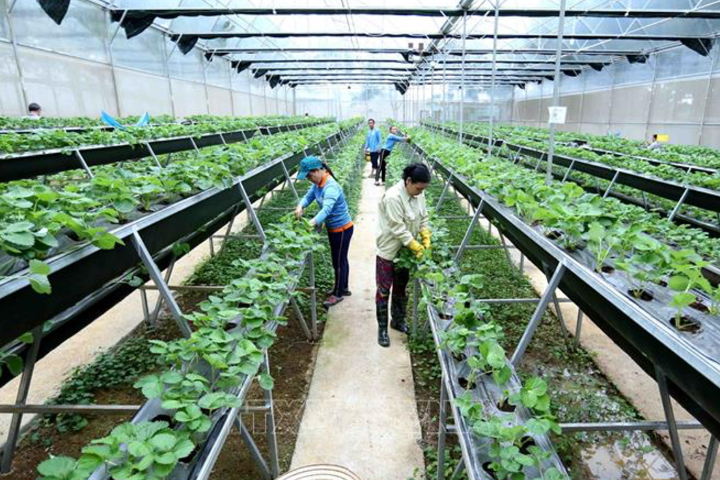The Ministry of Agriculture and Environment has recently announced a groundbreaking action plan for science and technology to implement Resolution 57 of the Politburo on the breakthrough development of science, technology, innovation, and national digital transformation. The sector aims to elevate science and technology to a global level.
7 key tasks
Deputy Minister of Agriculture and Environment Phung Duc Tien emphasized that science and technology are the key driving force, the "important force," and the "beacon" guiding the future of agriculture and the environment. Science and technology are also the driving force for sustainable agricultural development.
With this perspective, the Ministry of Agriculture and Environment has issued an action plan in Decision No. 503/QD-BNNMT. The plan includes 58 groups of tasks aimed at addressing 15 current bottlenecks. Among these, the sector identifies the following priorities:
First, the Ministry aims to raise awareness, innovate thinking, and strengthen political will across the sector regarding the development of science, technology, innovation, and digital transformation.
Second, the focus is on improving the institutional framework to make it a competitive advantage in developing science, technology, innovation, and digital transformation.
Third, the sector plans to increase investment and improve science, technology, innovation, and digital transformation infrastructure.
Fourth, developing and utilizing high-quality human resources to meet the requirements of science, technology, innovation, and digital transformation is a key priority.
Fifth, the Ministry seeks to accelerate digital transformation and apply science, technology, and innovation in the activities of Ministry agencies and units.
Sixth, there is a strong emphasis on promoting science, technology, innovation, and digital transformation in agriculture and environmental enterprises.
Lastly, the Ministry aims to strengthen international cooperation in science, technology, innovation, and digital transformation through multilateral and bilateral forms.
 The Ministry of Agriculture and Environment actively shapes governance frameworks on science, technology, innovation, and digital transformation in multilateral cooperation mechanisms. Photo: Vu Sinh.
The Ministry of Agriculture and Environment actively shapes governance frameworks on science, technology, innovation, and digital transformation in multilateral cooperation mechanisms. Photo: Vu Sinh.
Soon to issue the 4.0 digital transformation architecture
Deputy Director of the Digital Transformation Department (Ministry of Agriculture and Environment) Khuat Hoang Kien stated that the department is reviewing the plans and data of the Ministry of Agriculture and Rural Development and the Ministry of Natural Resources and Environment to integrate them into a common platform for the Ministry of Agriculture and Environment. In particular, they are pushing for integrating work records and online public services to operate and serve the people.
The department will soon issue the 4.0 digital transformation architecture in agriculture and the environment, specifying plans and key databases for each field and project. Land information is highly specific, with the primary data sources linked to local authorities. The department also advises the Ministry of Agriculture and Environment and the Government to encourage localities to collect and review data quickly, said Mr. Khuat Hoang Kien.
Building standards and regulations harmonized with international and regional standards
Nguyen Van Long, Director of the Department of Science, Technology, and Environment (Ministry of Agriculture and Environment), stated that the Ministry currently manages 1,832 Vietnamese standards (TCVN) and 175 Vietnamese regulations (QCVN) (1,464 TCVN and 103 QCVN in agriculture, 368 TCVN and 72 QCVN in the environment). From 2021 to 2024, the Ministry issued 475 new TCVN and 57 QCVN; simultaneously, 149 QCVN were reviewed and reduced in line with Government instructions.
The Ministry continues to review and amend standards and regulations to ensure they align with international and regional standards for exported products and new, key products.
As part of legal framework improvement efforts, the sector will review and amend 17 specialized laws and optimize internal processes on electronic platforms, aiming to replace paper-based procedures in administrative tasks fully.
In the coming period, information technology infrastructure will be further invested and completed to create a solid foundation for applying digital technology and artificial intelligence (AI) in agriculture and production management. The sector will focus on building resource and environmental data systems, land information systems, digitizing administrative records, and completing the national geographic database.
A key priority is attracting, utilizing, and retaining top-tier scientists and experts to lead national tasks on science and technology, innovation, digital transformation, and AI development. Scientific tasks will also be implemented by ordering and delegating high-quality human resources training in key technical and strategic fields.
The Ministry will create specific policies to attract domestic and international leading experts to contribute to developing science, technology, digital transformation, and innovation. Scientists will be at the heart of the innovation process.
By 2030, the sector aims for more than 90% of administrative procedures related to businesses to be completed online, smoothly, and efficiently. AI applications will be strongly developed to support disaster analysis, climate change response, environmental protection, and disease prevention.
The sector will promote science, technology, innovation, and digital transformation within the business community, particularly small and medium enterprises, cooperatives, and household businesses. Policies to encourage investment in these areas will be reviewed and proposed. Knowledge transfer and human resource training through FDI enterprises will also be further strengthened.
In the context of deeper international integration, the sector will actively shape frameworks and governance principles on science, technology, innovation, and digital transformation in multilateral cooperation mechanisms. The goal is to form a network of researchers to explore opportunities for applying these advances to efficient management and sustainable development of natural resources.